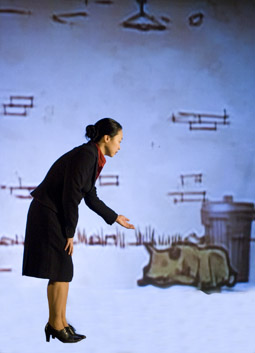 |
Sherry J Yoon, My Dad, My Dog, Boca del Lupo |
So am I. Although the dad-dog storyline continues to an inconsequential ending, other stories emerge and ramble about without apparent purpose. It doesn’t matter that the relationship between the woman and a slightly seedy pigeon smuggler (played with excellent timing and a submerged creepiness by John Fagan Tait) is never resolved. But there’s also a young Canadian filmmaker (Billy Marchenski) who may or may not be imprisoned in his North Korean hotel room by order of the autocratic Kim Jong Il. The filmmaker’s storyline peters out, as does the pigeon smuggler’s intention to study the rare cranes that have flourished in Korea’s demilitarized zone over the past 50 years. After narration and animation had spent several wonderful minutes building up to these magical cranes, I so wanted to hear more about them, and I missed them all the way to the end.
Animator Jay White stands stage left with the tools of his trade, and is a visible part of the action throughout. With his interventions, new scenes are often established by combining animation and live-action film. In front of a drawn backdrop projected onto the screen, White’s giant hand comes into view, setting out miniature pieces of furniture, where they appear full scale as set elements, but doll-house sized in relation to the hand of the artist.
At its best, the animation adds wonderful layers to the world of the play, literally. “I’m here for the birds,” the pigeon smuggler says as he sits outdoors with the woman. “So far I’ve only seen pigeons, but I’m optimistic.” And here comes a projection of the out-sized artist’s hand, holding a real magnifying glass. The glass reveals a miniature crane hidden in the painted foliage behind the couple.
In moments like these, the animation dominates the production, and it’s so good-natured and virtuosic that it temporarily blinds us to the fact that the overall aesthetic is fragmented. Scratchy black and white line drawings are mixed with full-colour, painterly scenes. Single animated elements trade places with panoramic views. The screen itself is often used to support the live action, but at other times it’s the actors who are helping to animate the screen. When the screen displays scenery, it maintains the focus on the foreground action. When the actors interact with animated images, their attention is directed upstage, emptying the playing area. At other times animation and actors are merged on one flat plane, as with silhouettes. And some moments are purely filmic, providing a sense of immensity in a small, black box theatre.
For some reason the narrator (Sherry J Yoon playing herself) feels compelled to interrupt this unusual world to tell us the dog’s a symbol, to teach us facts about North Korea, or to tell us what parts of the play were based on personal experience. The show’s creators are too aware of the information vacuum in our media on the subject of North Korea, and their concern for our education stilts the script. Without the narrator’s irritating presence, the play would have been almost twice as good.
Animation is laborious work, and the co-creators noted in a post-show talk that the “rhythms of animation and theatre are very different.” New plays in development are often being revised late in the production process; working with an animator would make that approach impossible. An 80-minute play represents a powerful amount of work for a single animator, and it may be that the needs of dramaturgy were overridden by the needs of animation. I still appreciate Boca del Lupo’s desire to try the partnership.
I absolutely loved this play for the first 20 minutes, and I’d see it again. But My Dad, My Dog has at least three unfinished stories, a constantly changing aesthetic, and an extraneous narrator. These post-modern embellishments weaken what would otherwise have been an absolutely captivating night at the theatre. The images are wonderful, but something’s gone awry when the strongest parts of a play are its scene changes. The variety of visual approaches could still triumph if the script were stronger, but with this script, the animation almost felt gimmicky at times. White’s obvious talent saves it from that. I left the theatre feeling oddly sad. This play had so much going for it, and a near miss can be devastating.
Boca del Lupo, My Dad, My Dog, created by Sherry J Yoon, Jay White, director Jay Dodge, performers Billy Marchenski, James Fagan Tait, Sherry J Yoon, animation and scenography Jay White, music Alicia Hansen, costumes Reva Quem, lighting Jeff Harrison, Jay Dodge; Roundhouse Community Arts and Recreation Centre, Vancouver, Jan 25-26, Jane 29-Feb 2; PuSh International Festival of Performing Arts, Jan 16 - Feb 3
Anna Russell is a Vancouver writer and filmmaker who is also an analyst with the Canadian Federal Government.
© Anna Russell; for permission to reproduce apply to [email protected]








 back
back